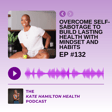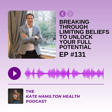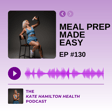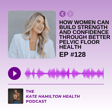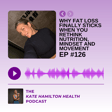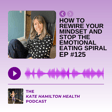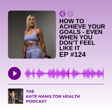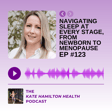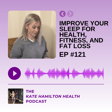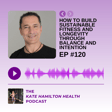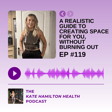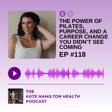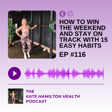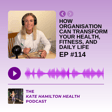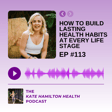
#105: Catriona Kirwan: Training for confidence, endurance and a balanced lifestyle
Struggling to balance fat loss, muscle building, and endurance training?
In this episode of The Kate Hamilton Health Podcast, I sit down with Catriona Kirwan, online fitness coach and owner of Recreate Coaching. We chat about what it truly means to achieve body composition goals while maintaining performance, confidence, and a sustainable lifestyle.
Catriona shares her journey from yo-yo dieting to coaching, breaking down common misconceptions around training, nutrition, and mindset. We tackle the challenges of losing fat while training for a marathon, the realities of photo shoot prep, and why lifting weights is essential for long-term health.
If you're looking for real, practical strategies to build strength, fuel performance, and create a balanced approach to fitness, this episode is for you.
Episode Highlights:
[00:00] – Welcome to The Kate Hamilton Health Podcast
[01:36] – Meet Catriona Kirwan: Online Coach & Fitness Enthusiast
[02:21] – From Yo-Yo Dieting to Coaching: Catriona’s Transformation
[04:44] – Balancing Sports Performance & Nutrition
[07:11] – Fat Loss vs. Endurance Training: Can You Do Both?
[11:09] – Why Enjoying the Process is Key
[18:18] – Behind the Scenes of Body Composition Coaching & Photo Shoots
[27:21] – Setting Realistic & Fulfilling Fitness Goals
[36:47] – Client Weight, Body Composition & the Bigger Picture
[37:43] – Building Confidence Through Small, Consistent Habits
[38:47] – Time Constraints & the Pressure to See Results
[39:04] – The Long-Term Approach to Sustainable Fitness
[43:07] – How Stress Affects Body Recomposition
[43:43] – Biggest Myths About Body Composition & Fat Loss
[44:16] – Why Lifting Weights is a Non-Negotiable for Women
[45:58] – The Role of Diet Breaks & Maintenance Phases
[47:49] – Muscle Building Benefits You Didn’t Know About
[51:25] – Reversing Out of a Diet & The Power of Food Quality
[55:20] – Improvement Phases & Why They Matter
[01:01:49] – Balancing Flexibility & Nutrition for Long-Term Success
[01:07:50] – Defining Health & Finding True Balance
Links & Resources:
- Connect with Catriona on Instagram here
If you enjoyed this episode, please subscribe, leave a review, and share it with friends who might benefit. For more health and fitness tips, follow me on Instagram and TikTok @katehamiltonhealth.
Music b LiQWYD Free download: hypeddit.com/link/xxtopb [http://hypeddit.com/link/xxtopb] Promoted by FreeMusicPromo [https://www.youtube.com/channel/UCbycji-eySnM3WD8mbxPUSQ] / @freemusicpromo
